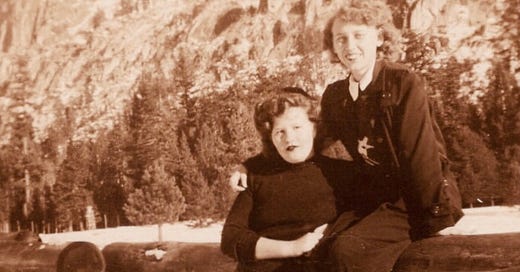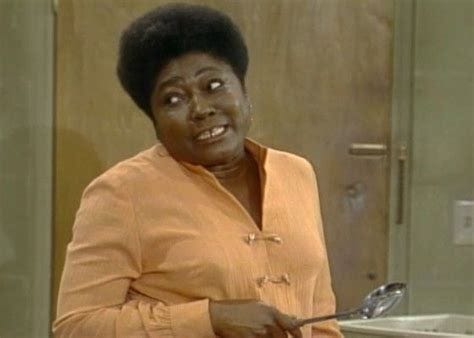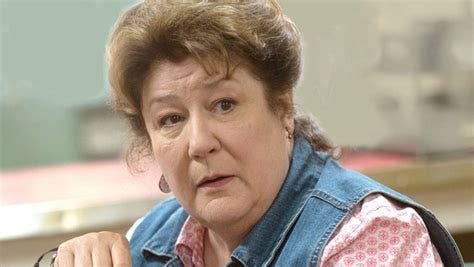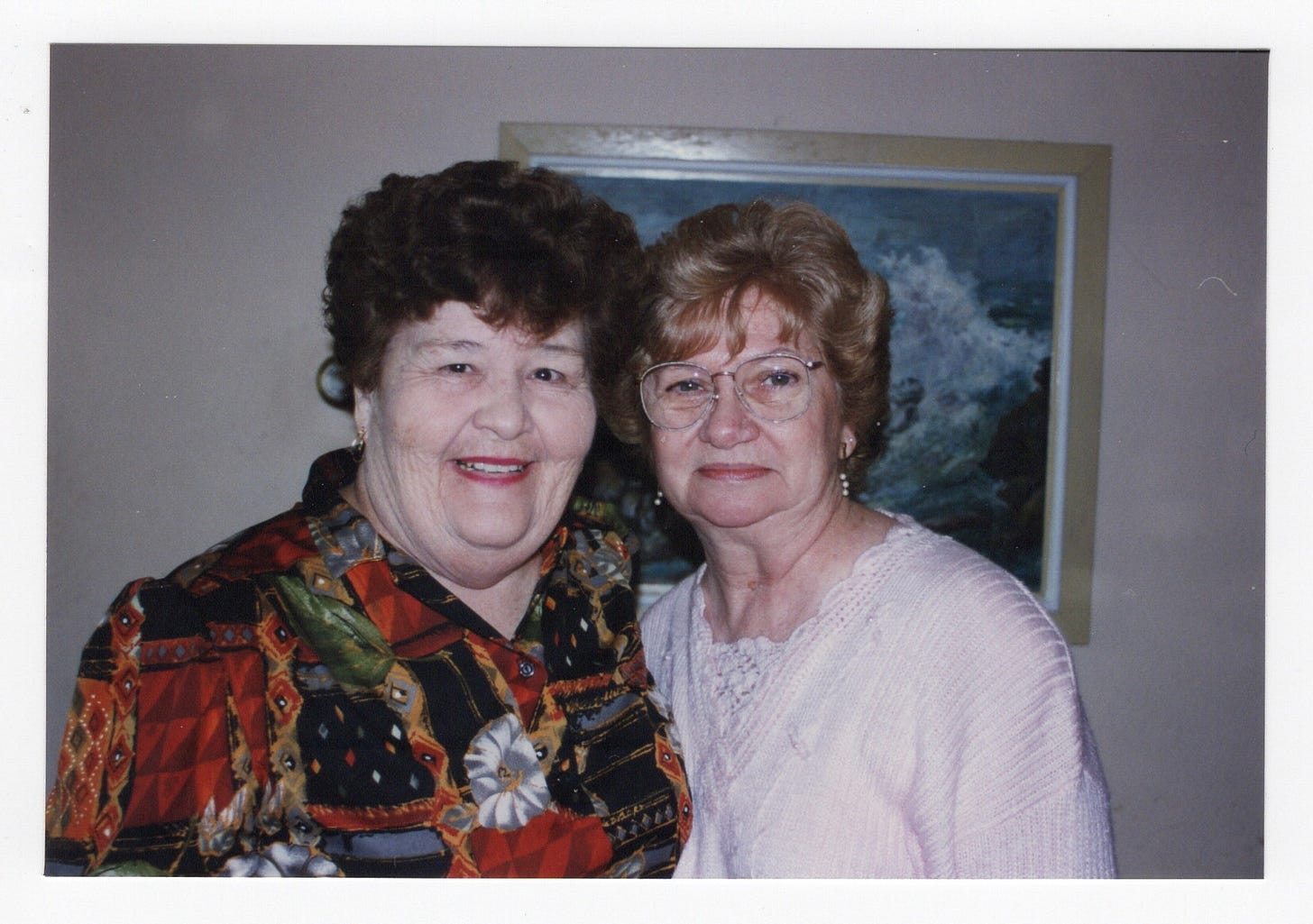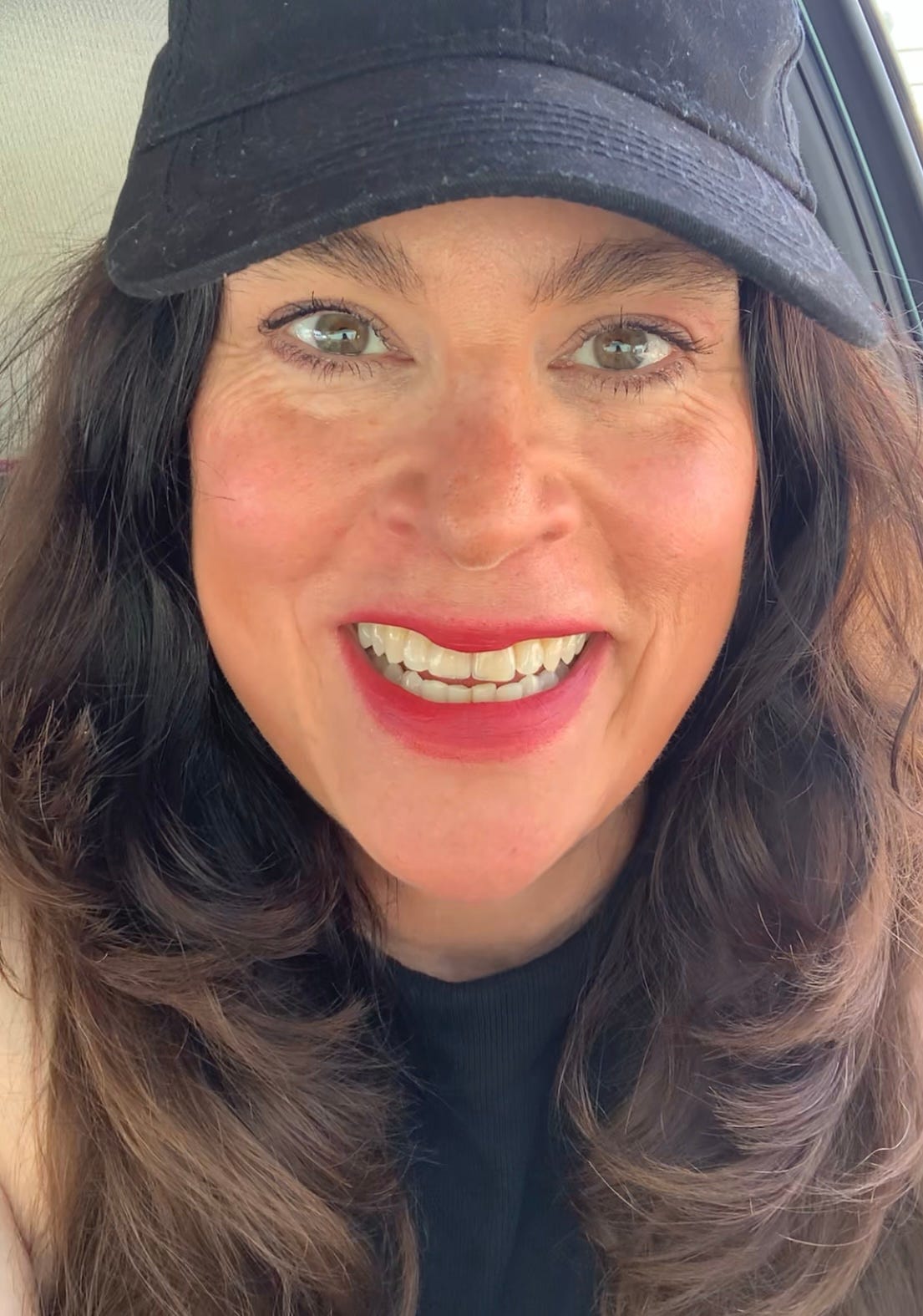What My Grandmother Taught Me About Being A Friend
10 Essential Traits To A Successful Friendship
Photo: My Grandmother and her best friend Lucille, in their teens.
I was sharing with my friend Julie how my grandmother used to say, “To have a friend, you have to be a friend.” Julie said, “You could write an entire piece on that;” so I did, and I’m sharing it with you here (thanks Jules).
Robust, beautiful, 60+ year friendships of depth were modeled for me as a child by my grandmother. I’m grateful for the lessons she and her friends taught me in how to nurture my own long-term friendships, which are so very dear and meaningful to me. May I be successful in paying it forward here.
I loved my grandmother very much. She raised me; and so in many ways, our relationship was more of a mother/daughter dynamic, à la shades of the film Lady Bird. We didn’t always see eye to eye, but we were devoted to each other’s care for many years. To me, my grandmother was a cross between the great Esther Rolle, as the character Florida Evans in the 1974 TV show Good Times, and a tad softer and more honest version of the character Audrey Bernhardt, the matriarch of the family on the 2015 Amazon series Sneaky Pete, played by the incomparable Margo Martindale. Although, as my husband noted, my grandmother was not nearly as emotionally expressive as either of these characters.
Granma had a warm and friendly public demeanor but was not an affectionate parent who was comfortable with cuddles, hand holding, or extended hugs. She preferred instead to give the three-hand-pat-mostly-side-hug with a gracious compliment to the host, or a kind word of appreciation to a friend. She had a sweet smile and a quiet, unassuming way of blending in the background, which hid how stubborn, strong, and stoic she actually was.
Gary Chapman, author of The 5 Love Languages—which are acts of service, gift-giving, physical touch, quality time, and words of affirmation—would likely agree that my grandmother’s love language was gift-giving. It’s helpful to know when creating friendships what a person’s love language is. If all you desire are words of affirmation, yet all someone is comfortable expressing is gift-giving, you may be dissatisfied with your friendships; and it may have nothing to do with how the person actually feels about you, or you about them.
True friendship, like true intimacy, is a ball made of many rubber bands—each stands on its own, stretch any one too far, and it will snap, layer them together, and they become something bigger. Here are the 21 friendship qualities I have witnessed to be most significant: honesty, trust, communication, commitment, accessibility, responsiveness, kindness, appreciation, connection, love language, reciprocity, support, guidance, loyalty, forgiveness, laughter, care, fun, acceptance, integrity, and unconditional love. The following are a series of vignettes about my grandmother and the aforementioned qualities she used to maintain her treasured friendships.
Granma taught by example. While she had many people who called her a friend through her work and interests, she had three main girlfriends from her bowling league: Flip, Flo, and Lucille and three main close family members who were also friends: her cousin Ina, her sister Barbara, and her Sister-in-law Mary Ellen. She and my grandfather, Papa, also shared a group of friends who were couples. Each month, a different couple would plan an outing (dinner and a show, a nature hike, game night, etc.) and they called this the STUNT CLUB. Before parenthood and the pandemic, my husband and I carried on the tradition of the stunt club with our friends who are couples; and we loved it. Couples need as much support as individuals.
When my grandmother’s friends died one by one, from dementia, disease, and natural causes (whatever those are), she moved into an assisted living facility, and she made new friends and had them until she passed. My grandmother knew how to be a friend, and these are the 10 traits she taught me:
1. SHOW UP
To be a friend, we have to love and show up for others in the way we would most like to be loved and have others show up for us too. A friend is someone we choose to share our life with, as they share their lives with us, when and how we are able to, not a job we have to be responsible for or accountable to. A friend is not someone to be seen as a resource for our wants and needs, nor theirs. It’s not someone we derive worth from because their social status raises our own by association. Healthy Friendships are fluid and flowing, not fixed and inflexible. They have healthy boundaries to prevent codependency and enmeshment. A friend is someone whose company we enjoy and delight in, who makes us feel better just thinking about them, who can become chosen family we love and cherish. Friendships require that we show up, not just when it’s convenient for us, but also when we feel most wanted and needed by our friend. Be there for the good times and the bad. No matter how busy my grandmother was, she always celebrated her friend’s birthdays, checked in on them when they were sick, and maintained consistent contact. She was present in the ways that she could be; and in turn, her friends were for her as well. We can’t expect friends to be there for us when we need them, if we only show up for them when we want them. All relationships are a balance of managing both wants and needs. Love is not always convenient. Showing up for the people we love and who love us, when it’s not easy to do so, is part of what it means to love someone. To be self-sacrificing all the time is co-dependent martyrdom, to be self-sacrificing every now and then, is a balanced interdependence of love and consideration. We can’t be all things to all people, but we can show up for the select group of people we make commitments to.
2. COMMIT
Friendships are commitments. Therefore, be careful with whom you choose to make a commitment. Take your time to get to know people before you commit to them. It takes at least a year to really get to know a person’s character and integrity. If they spend most of their time bragging about what they get away with and laughing at the expense of others, they will likely mock and manipulate you as well, for entertainment. If they are sharing other people’s personal business with you, then they will probably share your personal business with others. If everything wrong in their life is someone else’s fault, you will likely be added to the list of blame too. If, however, they use respectful discretion when talking about others, they will likely do the same with you. If they spend more time discussing ideas than they do other people and problems, they will have something interesting to share with you beyond gossip about others and constant complaints. If they speak of appreciating the friends they already have, they are more likely to appreciate you as a friend as well. Find out who their long-term relationships are with and how they resolve conflict, as well as keep their bond going strong. People who come together from a place of love, stay together from a place of acceptance. My grandmother’s friendships were built mostly around shared time, not necessarily shared values. She and her friends allowed each other to have different political opinions, religious beliefs, and ways of managing money, family, and time. They had far more acceptance and tolerance of each other’s differences than people seem to have today. Breaking free from the echo chambers helped expand their perspectives on life. They focused more on enjoying each other than on finding faults in one another. They were committed to the friendship the way they were committed to their families or spouses. Granma would caution, “Be discerning. If you make friends with someone who can’t commit to a relationship with a significant other, what makes you think they can commit to being your friend?” Commitment requires self-reflection, and not everyone likes what they see when forced to look in the mirror. Commitment is a character trait in the other person not necessarily a reflection of how they feel about you. People who lack the ability to commit often have unresolved trauma. If you build a relationship with someone on a trauma bond, it will likely end from a trauma wound. To those fair-weathered friends who couldn’t commit, Granma would say, “with friends like those you don’t need enemies,”to which she would follow up with another proverb heading me to “keep my friends close, my enemies closer,” which I found dreadfully confusing and a poor use of my resources. Nevertheless, I took in her words.
3. CONNECT
Not all people have the same definition of what it means to remain connected. One person needs to hear from their loved ones every single day to feel connected, another needs only to hear from loved ones once a year, or once a decade, and many more fall somewhere in between. True friendships offer points of connection without need for possession. My grandmother’s friends primarily engaged through common interests. Flip was Granma’s once-a-month card playing buddy. Flo was her once-a-week gambling partner in crime; and come on, with a name like Flo, how could you not enjoy hanging out in casinos together?! Lucille is in the picture with my grandmother, Ella; they bowled, gambled and went to nursing school together. My uncle tutored them in math for their nursing classes—dream careers they chose to pursue in retirement. They were there for each other through every trial and tribulation, including when it came time to bury each of their husbands.
When I was a child and Lucille’s husband was ill and she took time off from the bowling league, Granma would bring me in tow to their house to check in on her. They’d sit me at the table with a plate of cookies while they went into the parlor to chat. I watched them through the narrow doorway as they sat in the Queen Anne wingback chairs facing each other; and I paid attention to the way they conversed, taking turns in how they shared and reacted to each other with active listening. They’d update each other on how they were doing with facts first, quick acknowledgement and commentaries next which were punctuated with wit, followed by a wave of laughter, then a few quiet nods, and a bout of silence that called the visit to an end. They’d walk into the kitchen, patting each other on the back and smiling. We’d all hug goodbye and sometimes Granma would leave with a list of things to pick up for Lucille or with a gift Lucille had picked up for her. They’d always say to each other, “Call me if you need anything.” They showed their care and affection through large and small acts of thoughtful friendship devotion.
4. APPRECIATE
Friends are not investments; they are gifts to be appreciated. An investment is something you expect a return on for your time. A friend is someone we enjoy having shared experiences and spending time with, not someone we “give to” in order to “receive from.” We don’t pour time and energy into our friends so that they will pour time and energy into us. If we do, that’s an arrangement of expectations that deserves to be communicated. Genuine friendship connection happens organically as a result of appreciating who another person is in this world, and in our lives. Unconditional love is loving and giving without expectation of quid pro quo, while still maintaining self-respect in choosing not to give endlessly to a relationship that lacks some level of reciprocity.
5. RECIPROCATE
A healthy relationship is when two people give equal care to the relationship; not where one person does all the giving and the other all the taking. My grandmother felt very strongly about reciprocity. She did not give her time or energy to any family member or friend who didn’t reciprocate. In fact, she took reciprocity to a quid pro quo level that is personally uncomfortable to me. This is where we diverged in our beliefs about relationships. Sometimes we learn what to do by the example others set, and sometimes we learn what not to do by the example others set.
My grandmother was the middle child, the caregiver for her children, grandchildren, parents, siblings, their spouses, and her friends. I think by the time her teenage daughter gave birth and abandoned me, and my grandmother inherited me and reluctantly agreed to raise me as her own, she was feeling used up by family. From then on, she only gave to others when they gave to her; and she felt a sense of obligation to give back anything she received. I understand why she took a tit for tat approach to giving and receiving, and I have compassion for her circumstances. However, in my own life, there are people I love and desire to give to who may never give back to me and there are people I have received so much from who I will never be able to repay. Therefore, I do not define reciprocity as quid pro quo.
Reciprocity is mutual giving without expectation for return. Quid pro quo, which is Latin for “something for something,” is giving with an expectation for return. The difference between reciprocity and quid pro quo is subtle but distinct: reciprocity is an often-unspoken expectation, yet still only an option; and quid pro quo is a spoken expectation with an agreement, a contracted investment of sorts. This is the great relationship dichotomy: the act of giving is the absence of expectation for return and yet a self-respecting relationship is one built on reciprocity.
If we find ourselves in a relationship in which we do most of the giving, reaching out, planning to get or be together and are more flexible with time, dates, and plans changing than the other person, then we are not in a relationship built on equality and reciprocity. It can be hurtful. No self-respecting person would solely choose to maintain an unequal dynamic. If we are unsatisfied with the imbalance of reciprocity in our relationship, then it’s our job to communicate that, express our expectations, and negotiate our wants and needs. If we can’t get other people to change how they treat us, we have to change how we allow ourselves to be treated. A one-sided relationship fills the cupboards for others but never provides nourishment for the self.
Sometimes we will need to make peace with a lack of reciprocity. If our happiness and inner peace is dependent on the behavior of others, we are giving our power away and may be condemning ourselves to a life of misery. When we don’t get what we want from the people around us, we either learn how to give it to ourselves or surround ourselves with new people. As the saying goes, “You can’t CHANGE the people around you, but you can change the PEOPLE around you.” The most consistent person we change will be our self. It’s much easier to change the dynamics of any relationship by changing our perspective and expectations than it is to change the beliefs and behaviors of others.
In unhealthy dynamics, the relationship is between one who gives and one who takes. In an ideal world, the give and take between two people is equal. In reality, typical relationships are made between those who give … and those who give more. Our expectations for reciprocity often derive from what we are willing to give and receive ourselves, which may be far greater or less than what the other person is able to give and receive.
Reciprocity is sorely lacking, if we make someone a priority in our lives while remaining only an option in theirs. To maintain the respect balance of reciprocity in relationships, we have to match at the lowest common level of giving, not the highest degree expected. In order to have reciprocity in the “essential versus optional” paradigm, one of us would have to alter the priority we make the other. It’s far easier to make someone a lower priority in our lives, in order to maintain respectful reciprocity, than it is to wish, struggle, or fight to be a higher priority in their lives. We can’t make people love us the way we love them, but we can choose to meet them where they are while focusing on where we’d like to be. Some people are simply unwilling to prioritize relationships and be inconvenienced by love.
6. FORGIVE
Human beings are imperfect and can be disappointing, especially when we expect them not to be. Imperfection + expectation = conflict. Don’t take anything personally, unless someone has the courage to tell you, “It’s personal,” and the grace to allow you to work through any misunderstanding or mistake and repair the damage. Committed friendships don’t end just because there is a disagreement. When my grandmother got annoyed with one of her friends, or they with her, they spit it out instead of sweeping it under the rug. They knew they could trust each other to be as earnest in conflict as they had been in connection. One person would say what upset them. The other would listen. Then they took the time to be silent for awhile, thinking about how what they did hurt the other. They were not reactive nor defensive. They didn’t spend time thinking of how to justify their behavior. Instead, they focused on empathy, on how their behavior hurt their friend. They took in how their actions made the other feel; and they either apologized and changed their behavior or apologized, accepted themselves as is, and didn’t change their behavior. The most important factor was that they listened and heard each other. They were the “forgive & forget” generation. Whereas today, we live in the generation of “constant self-improvement / judge others by unattainable standards / cut them off if they stop being fun or don’t live up to our unrealistic expectations.” When my grandmother and her friends had conflict, one would usually end up buying the other a box of See’s Candies (dark chocolate nuts & chews) with a note that read, “Sorry I hurt you.” Then, they would carry on in their friendship as if nothing happened. Sure, they might tiptoe around “tender areas,” as my grandmother called them, but not to the point of feeling as if they were always skating on thin ice or walking on eggshells. They made jokes about those “tender areas” and laughed it off. They felt safe confronting differences because they knew they would not lose their friendship over it.
7. ACCESSIBLE
While my grandmother had many friends, she also very much enjoyed her time alone, something I deeply connect to. My grandmother was a hard worker who had multiple jobs, maintained many interests and social groups, and loved jury duty. (She was chosen for every jury for which she was ever called to serve and took her civic duty, from managing voting polls to serving on a jury, very seriously.) When she was with her friends, it was to play cards, bowl, or gamble—she did not enjoy chatting on the phone or writing letters—so if you didn’t get her in person, you weren’t likely to get much of her. She was also her own best friend and enjoyed spending time relaxing at home alone. She was an observer. She liked to watch sports, every single soap opera on each network, do crossword & anagrams puzzles (with a pen), listen to the news, and people watch. Between sports and soap operas, she could fill entire days with television viewing and her favorite snacks, and truly find joyous pleasure and relaxation. However, sometimes, our friends need more access to us than we need to them. One thing I love in my relationships is the way we will send little texts with a heart emoji just to let each other know we’re thinking of the other but not necessarily available to visit. Sometimes our friends may be going through a hard time, feeling lonely or overwhelmed during a period in which we find ourselves enjoying sustained peace and internal contentedness (or too overwhelmed ourselves to feel like we can be fully present for another). When my grandmother realized that her friends needed access to her to feel connected, even if she wasn’t feeling the need to access them, she would balance her needs with theirs. She set the boundary to honor when she needed time alone, while also making herself accessible to others by finding the middle way—which for her was to leave the her door open to others but not necessarily interrupt her routine to entertain guests.
8. RESPONSIVE
Most mornings, one of Granma’s friends or relatives came to the house unplanned and rang the doorbell. The dogs would bark and the voices outside the door would call them by name which would silence their voices and activate their tails to wagging. My grandmother would remain seated in her robe, drinking her coffee, reading her paper in her Barcalounger, and doing her puzzles. She’d say, “Door’s open;” and they’d come in, help themselves to a cup of coffee, sit on the sofa, and join her in the living room. One of the things I admired about my grandmother was that she did not feel the need to “be on” around others. Her attitude was that people were always welcome but that they’d have to take her as she was (dressed or in her robe/engaged or busy). Her loved ones would prattle on about family drama or something sensational in the news. If you weren’t funny, she didn’t laugh. If what you had to say wasn’t interesting to her, she didn’t respond. She was polite but still authentic. One of her biggest pet peeves was “phony people who put on airs.” Granma would listen and give a lot of nods, and one word replies behind her newspaper, “Hmm. Oh. Really?” Sometimes she’d lower the newspaper to give an occasional raised eyebrow, or side eye, or make a joke. She had a wryly dry sense of humor, reminiscent at times of Bob Newhart. The visit would last 15-30 minutes and through it all, a multitude of hearty laughs floated in the air. If her guest was really upset, she’d set the paper down, give them her full attention, or suggest they interrupt the pattern, get out and do something together. Most of the time, she knew that her friends and family just needed some response to feel heard, to know they were seen and cared for by having some access to her and responsiveness from her. Doing so in the way she did, she was also teaching them how to be their own best friend and find self-care routines, how to be accessible and responsive to themselves for themselves.
9. SUPPORT
My grandmother had an unspoken 90/10 friendship rule: she spent 90% of the time being an encouraging cheerleader (lifting up & helping out) and only 10% a corrective guide. The role of a friend is often to elevate others, only step in when asked, and only if what you have to say can create more good than harm. Be the mirror who is not attached to how the reflection is seen. A good friend will know when to challenge you to be true to yourself—not play small—and when to allow you the freedom to be a train wreck, because it’s your life, your experience, and this is how you learn. Giving advice more than 10% of the time is sometimes helpful and necessary, but it risks shifting the dynamics of friends who are equals to one friend being the doctor/guru/rescuer while the other friend becomes the patient/student/victim. Friends allow people to grow in their presence, with both ugly weeds and beautiful flowers, without the need to feel they have to tend to the gardens of others in order to enjoy them.
10. LOYAL
My grandmother did not engage in gossip, and if anyone brought gossip to her, she’d say something like, “Don’t tell me about the negative comment someone made about me or someone else. Tell me what you said to defend them or me.” Once she decided she liked someone, she did not allow anyone to speak poorly of them nor would she. If she didn’t like someone, they knew it and so did everyone else. She simply didn’t speak to them or of them. Rather than being the person who walked into a room questioning who would like her, she walked into a room questioning who she might like. She remained polite to all while making decisive cuts over who she liked and disliked immediately. Like my daughter, her first impressions of people were usually spot on; and she rarely strayed. She was a fan of the underdog and gave some people the benefit of the doubt more than they deserved and judged others too harshly. Once she was devoted to someone, she was always devoted. What my grandmother’s friendships taught me is that people don’t love us because of our status or a belief that we are special. They love us because we love them. We aren’t worthy because of what we are, but rather that we are. So often, to feel love, we simply have to love others and be loving, in order to be loved back.
The good news is that we don’t have to be a perfect friend in order to be a good friend. In Elizabeth Gillespie’s Ted Talk, she states, “Research shows we only have to get it right 30% of the time to maintain close relationships.” Here’s to doing our best to show up 100% of the time and offering ourselves grace if we only make it 30% of the time. In the end, that’s what matters most—showing up.
Here’s a picture of my grandmother and Lucille moving into their 70s. They were friends from their teens until their 80s, until death did they part.
Sage Justice is achingly sincere. Balancing wisdom and humor she most often writes deeply personal solution based pieces about the enduring virtues that connect us all: love and healing. She is an award-winning playwright and critically acclaimed performing artist who has appeared on stages from Madison Square Garden in New York City, to The Comedy Store in Hollywood, California. Ms. Justice is the author of Sage Words FREEDOM Book One, an activist, a member of the Screen Actors Guild and an alumna Artist-In-Residence of Chateau Orquevaux, France. She is a co-founder of The Unity Project which fuses activism with art, to educate and inspire, with a special emphasis on community engagement to end homelessness. She has a series of short reels about living with the rare genetic disorder, Vascular Ehlers-Danlos Syndrome that you can find in a highlight reel on her Instagram page @SageWords2027..

